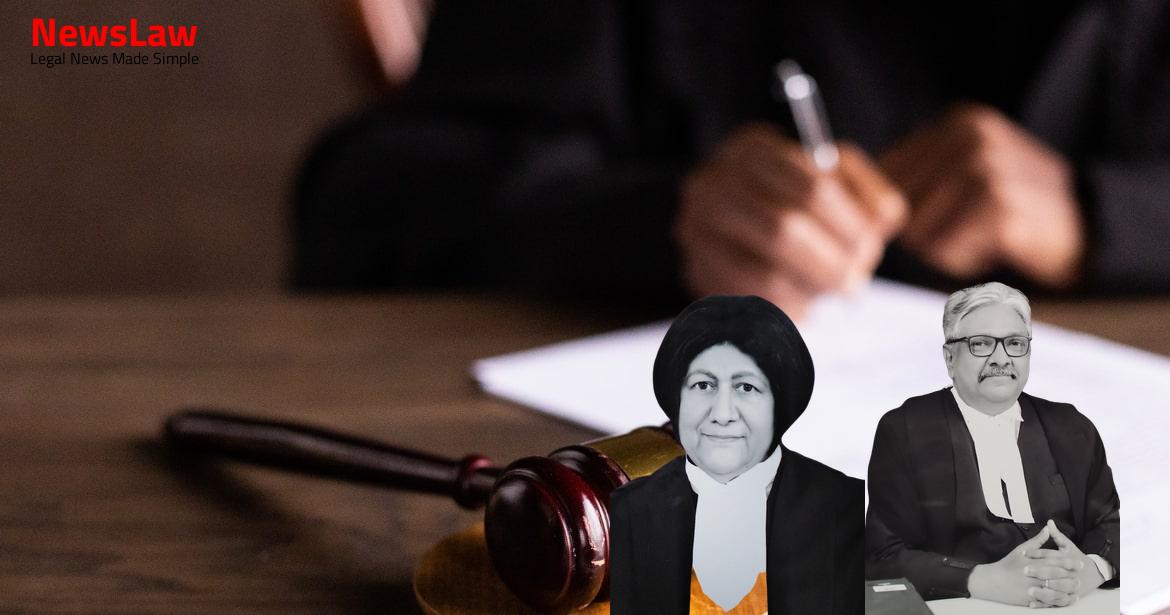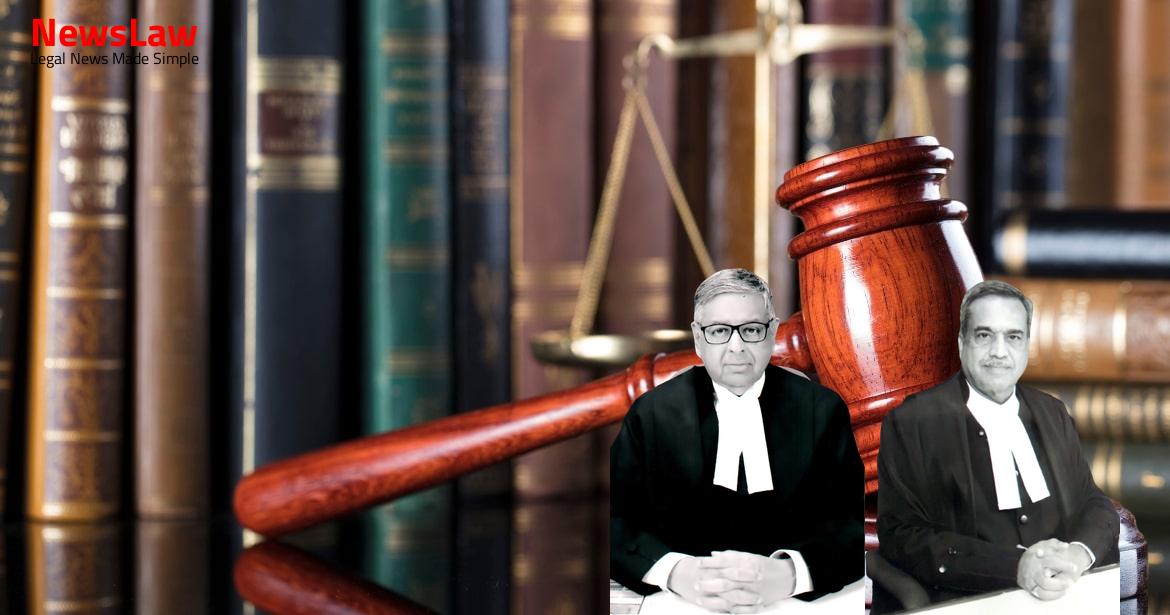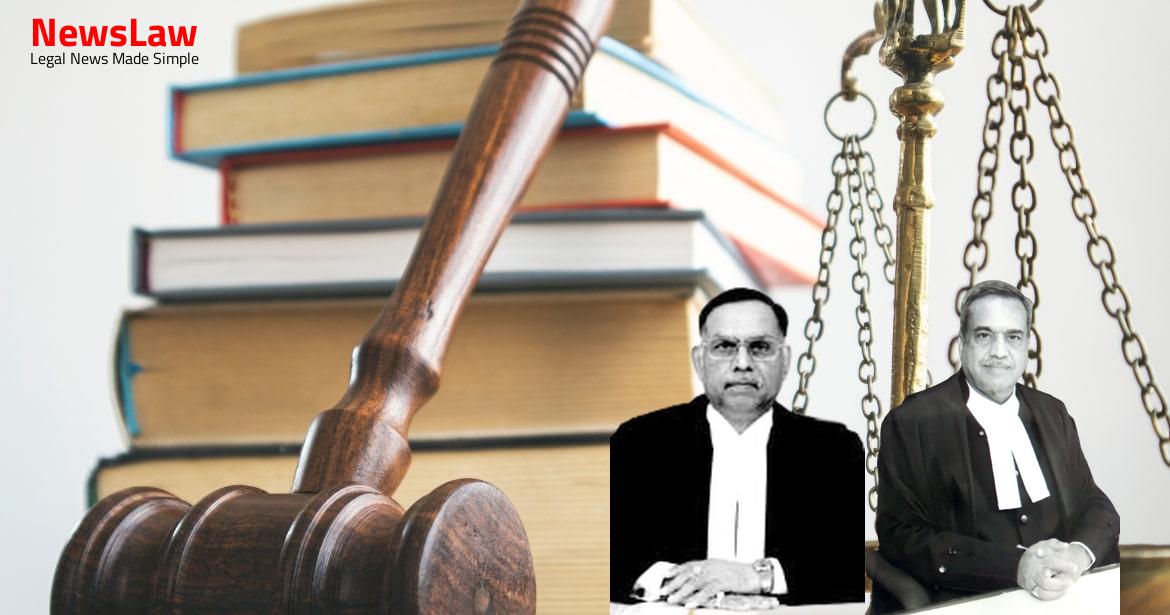Explore a detailed analysis of a court’s decision regarding the management of a Corporate Debtor’s funds during a moratorium. The court’s legal analysis and interpretation of relevant laws and regulations play a crucial role in ensuring the fair resolution of financial transactions amidst insolvency proceedings. #LegalAnalysis #CorporateLaw
Facts
- The Appellant filed an FIR on 27.04.2020, alleging illegal transactions and transfers by the former Managing Director.
- The former Managing Director transferred Rs. 3.29 lakhs to a close associate and Rs. 32.50 lakhs to Respondent No.1 without authorization.
- ICICI Bank put a lien on Respondent No.1’s account on 04.05.2020.
- Directors of the company defended the Rs. 32.50 lakhs withdrawal as payment for raw materials, violating the moratorium.
- Former Managing Director’s application for injunction was disposed, and the High Court allowed Respondent No.1 to operate their bank account.
- An application under Section 7 of IBC was admitted against National Plywood Industries Limited.
- NCLT ordered former Directors to refund unauthorised withdrawn amounts and cooperate with RP.
- NCLT found former Directors prima facie liable for the unauthorized withdrawals.
- A petition under Section 482 challenged the FIR for the illegal Rs. 32.50 lakhs transaction.
- NCLT directed Corporate Debtor to transfer funds to RP’s account and lift liens on corporate accounts for RP’s operation.
Also Read: Electoral Malpractices in Mayor Election
Arguments
- The purpose of the moratorium would be defeated if members of the previous management are left free to transfer funds of the Corporate Debtor.
- The finding of the High Court contradicts the documents of Respondent No 1.
- Allegations about the former Managing Director of the Corporate Debtor’s interest in Respondent No.1 Company should not be a disputed fact for investigation.
- The appointment of the Appellant as the Resolution Professional under Section 25(2)a of the IBC gives them custody and control of all assets of the Corporate Debtor.
- Emphasis on the nature of jurisdiction under Section 482 of the Cr.P.C.
- The High Court overstepped its power in issuing the impugned order.
- The impugned order was contrary to Section 14 of the IBC.
- The High Court permitted the investigation to continue in the petition under Section 482.
- There is a report from the auditing firm supporting the case of the Appellant.
- Reference to the judgment in P Mohanraj vs M/S. Shah Brothers Ispat Pvt. Ltd. in Civil Appeal No 10355 of 2018.
- The Respondent No 1 was a related party of the Corporate Debtor.
- The Respondent No.1 had a longstanding business relationship with the Corporate Debtor, supplying raw materials and being owed a substantial amount of money.
- The Respondent No.1 was known to be a related party and its claim for over 6 crores was vetted, verified, and admitted by the Appellant.
- The Committee of Creditors acknowledged the relationship between Respondent No.1 and the Corporate Debtor, where relatives of the Corporate Debtor directors or shareholders held more than 51% shareholding in Respondent No.1.
- The transactions between Respondent No.1 and the Corporate Debtor were known and acknowledged, with purchases/sales benchmarked against arm’s length and open market transactions.
- The NCLT order directed the directors of the Corporate Debtor to refund the amount withdrawn from Respondent No.1, creating a lien on Respondent No.1’s accounts, which the Respondent No.1 argued was not justified.
- In subsequent orders, the functioning of the Appellant was questioned, with concerns raised about the objectives of the IBC being defeated based on claims and FIRs.
- The Respondent No.1 highlighted the impact on workers’ salaries due to the amount paid by the former management without authority, causing a delay in salary disbursement.
Also Read: Balancing Power and Transparency: Electoral Bonds Struck Down, Disclosure Mandated
Analysis
- The High Court’s order, which was an interim order, seemed to have overlooked the limits of its power under Section 482 in the context of the Insolvency and Bankruptcy Code (IBC) provisions.
- Section 2A of Section 14 of the IBC enforces prohibitions upon declaration of moratorium, with the Resolution Professional requiring Committee of Creditors’ prior approval for certain matters.
- An order by NCLT allowed the Respondent No.1 to operate its account only after remitting Rs. 32.50 lakhs to the Corporate Debtor, emphasizing the Resolution Professional’s management role.
- Section 17 dictates that the Interim Resolution Professional exercises the powers of the Board of Directors, with financial institutions acting as per the Professional’s instructions.
- The Provision inserted on 28.12.2019 ensures essential goods and services are not terminated during moratorium unless dues are unpaid by the Corporate Debtor.
- The Appellant expressed grievance over transactions totaling Rs. 32.50 lakhs post the moratorium order, prompting the need for resolution by the IRP/RP guided by IBC objectives.
- The appointment of the Committee of Creditors initiates the Resolution Professional role, suspending the powers of the Corporate Debtor’s Directors or partners.
- Assets of the Corporate Debtor include amounts in bank accounts, managed by the Interim Resolution Professional since the date of the application’s admission.
- Respondent No.1’s business dealings with the Corporate Debtor were highlighted to justify the remitted amount in its account as payment for supplied materials.
- Regulation 32 of the INSOLVENCY AND BANKRUPTCY BOARD OF INDIA (INSOLVENCY RESOLUTION PROCESS FOR CORPORATE PERSONS) REGULATIONS, 2016 defines essential supplies.
- The moratorium period prohibits the Corporate Debtor from transferring, encumbering, alienating or disposing of any of its assets.
- Essential goods and services referred to in Section 14(2) are defined by Regulations.
Also Read: Recall of Resolution Plan Approval: Legal Analysis
Decision
- Appeal allowed with modifications to the impugned order.
- Respondent No.1 can pursue its claim for Rs.32.50 lakhs and other sums in the appropriate forum.
- No costs awarded.
- Lien on the bank account lifted, allowing the petitioner and creditors to operate the frozen account.
- Interim relief subject to withdrawing another petition and furnishing an indemnity bond.
- Appellant RP to bear in mind Section 14(2A) of IBC.
- Order not a pronouncement on issues from FIR or pending petition under Cr.P.C.
- The management of funds shall be in accordance with the provisions of IBC.
Case Title: SANDEEP KHAITAN Vs. JSVM PLYWOOD INDUSTRIES LTD. (2021 INSC 268)
Case Number: Crl.A. No.-000447-000447 / 2021



